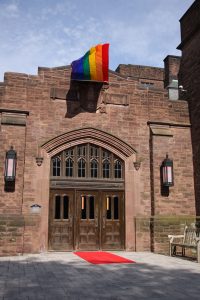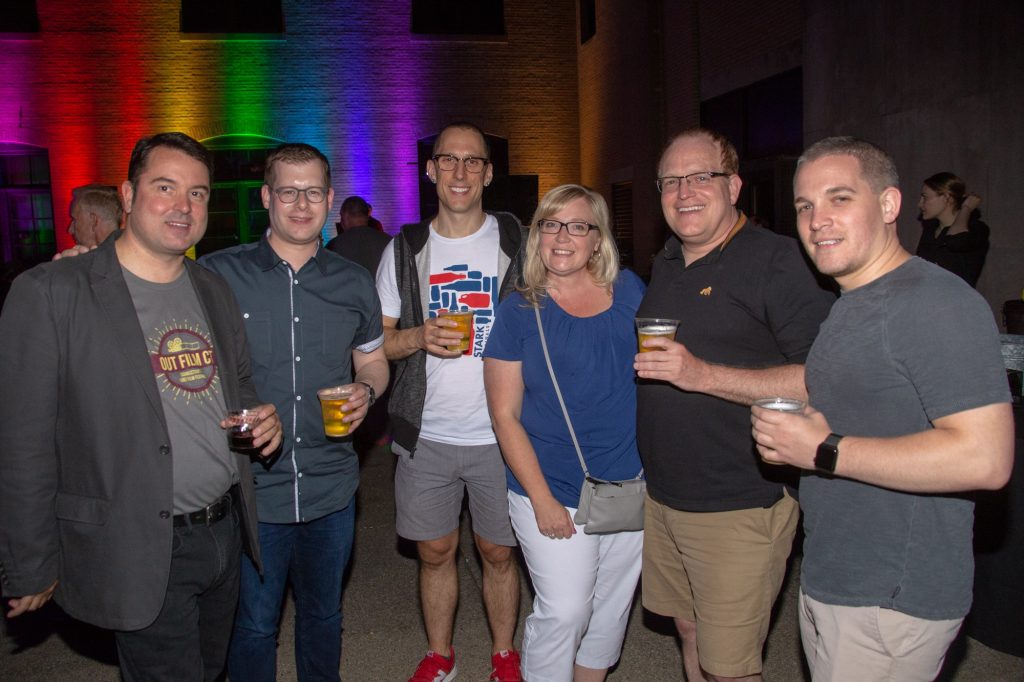By Cara Rosner
One of Connecticut’s largest annual LGBTQ events will soon return, as the Out Film CT festival once
again brings the latest films – and thousands of viewers – to the capital city.
This year’s festival will take place from May 31 to June 8 at sites including the Wadsworth Atheneum
Museum of Art and Spotlight Theatres Front Street Stadium 4. As usual, the films that will be shown are
intended to make people think, and get them talking.
Dating back to 1988, the festival has deep roots in the state and plays an important role, according to
Shane Engstrom, who has been festival director since 2008.
“It’s the state’s largest LGBT arts event that we know of,” he says. “We think it’s an important event to
bring the community together, because there are so few of those these days.”
Typically, about 2,000 people attend the nine-day event from throughout Connecticut and New England.
Preparations begin long before the festival begins, From August 2018 to March 2019, an all-volunteer
committee of about 10 to 20 people screened all of the films submitted for consideration; this year,
there were more than 520 submissions, a mix of shorts, documentaries and feature films.
Organizers expect several films in particular to generate buzz during this year’s event:
- “Canary” is a coming-of-age musical about a small-town boy who is chosen to serve a
compulsory two-year military training stint in the South African Defence Force choir and concert
group (known as the Canaries) during the height of apartheid. - “Tell it to the Bees” tells the story of a doctor in 1950s small-town Britain who develops a
relationship with her young patient’s mother. - “The Shiny Shrimps” tells the tale of Matthias, an Olympic champion at the end of his career
who makes a homophobic statement on television. As punishment, he has to coach the Shiny
Shrimps, a flamboyant and amateur gay water polo team working to qualify for the Gay Games
in Croatia, where the hottest international LGBT athletes compete.
New this year, the festival will showcase youth-focused films at Real Art Ways in Hartford, in partnership
with the venue as well as with True Colors, a Hartford-based nonprofit that provides education, support
and advocacy for LGBTQ youth. Featuring these films, chosen from the broader group submitted to the
festival, “allows us to put together a program of shorts that really represent the full LGBTQ spectrum,”
says Engstrom.
The long-running festival continues to evolve with the times, while remaining true to its core mission.
One of the biggest differences these days? Technology.
“It has definitely changed,” Engstrom says. “When I first started, when distributors and filmmakers were
sending us films to consider, they were sending them on VHS. This year, we didn’t even get any DVDs;
they were all submitted through digital links.”

In its early days, Out Film CT was known as AlteRnaTiveS; it was founded in 1987 by Bill Mann as a gay
and lesbian cultural group in Hartford at a time when LGBTQ social activism was on the rise. The group’s
first film festival, in June 1988, took place at Cinestudio – the independent film theater on the campus of
Trinity College in Hartford – and was co-directed by Terri Reid and Paul Brenner.
But the event wasn’t an immediate success. Organizers struggled to publicize it and had difficulty finding
an audience. Saddled with programming issues and trouble filling seats, organizers wondered if the
event would last past its fourth year, when attendance hit a low point.
Over time, though, the festival gained a foothold. In 2007, it earned the Outstanding Project Award from
the Connecticut Commission on Culture & Tourism for its work to enhance arts, history, film and tourism
in the state. That same year, the organization changed its name to Out Film CT to better reflect its film-
focused mission. Soon after, Engstrom became festival director and began working with committee
members to further expand and augment the festival.
These days, the nature of film festivals – regardless of their target audiences – is changing in an
increasingly digital age. Increasingly, filmmakers and distribution companies are bypassing the
traditional festival circuit and instead releasing films directly on DVD or through video-on-demand
services, Engstrom says.

Against that backdrop, Out Film CT is adapting, too. While the spring festival is the organization’s
signature event, the group is exploring other ways to have a year-round presence, Engstrom says.
“We’ve kind of changed with the times,” he says. One recent addition is the organization’s “Queer
Thursdays,” a yearlong LGBTQ film series held at Cinestudio, usually on the second Thursday of each
month.
This year’s main festival, as in past year, will offer something for everyone, Engstrom says.
“We try to pick films that will appeal to all different populations within the LGBT community,” he says,
noting the group is seeking additional volunteers to screen submissions and voice their opinions. “It’s
always a mix of different films and different themes.”
For tickets, a full schedule and more details about the Out Film CT festival, and to learn more about
Queer Thursdays, volunteer opportunities and more, visit outfilmct.org.







More Stories
Broadway Review: Art
Fall Arts Preview: Emus, Foxes and Eric Clapton, Too
Diane DiMassa Book Event September 25